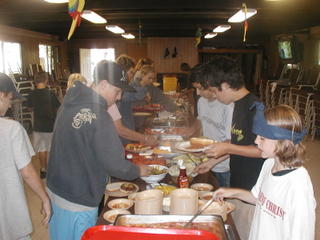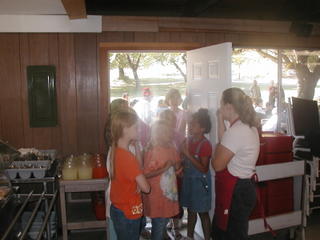Here are the lessons that I've learned in three years of camp:
Don't Work Your Staff to the Bone
Unless you're on some kind of ego trip or have an overactive work ethic, hire sufficient staff to keep sane work hours. I recommend six to eight hours per person per day if you can schedule enough volunteers. This gives staff time to relax and to participate in some of the camp programs.

Campers dig into the salad bar at lunch. The girl in the white T-shirt to the right is serving soup while on K.P. Each junior cabin rotates K.P. duty. A typical cabin does K.P. duty two or three times during camp. Two senior campers, one young lady and one young man, report to the dining room host each meal. They perform some of the heavier tasks, like washing pots and pan pans and taking garbage to the dumpster.
Our first year, all of the cooks worked 12-hour days. In 2003, many of us still worked long hours, but with longer between-meal breaks. Last year, with camp census at 150 (campers and staff), I used nine men and women in the kitchen.
I'm now considering an innovative schedule, like two meals on, two meals off to ease the workload. Don't forget to allow kitchen staff time to attend worship services and Bible study.
Hire Sufficient Cooks and Dishwashers
The first year, we hired a chef, two cooks, a cook's helper and a dining room host. You've already read about the 12-hour workdays. In 2003, I added two dishwashers to the crew to feed a camp with 135 campers and adults with good results. Last year, I was able to boost staff by two additional part-timers.
The dining room host gives instructions to a girls cabin assigned to K.P. duty for the meal. The dining room host manages "front of the house" activities for the chef. She is incharge of all the dining areas (indoor and outdoor) and supervises the dishwashers and the cabin on K.P. At our camp, the dining room host prepares the beverages and helps set up the salad bar.
At a minimum, you need a chef (or head cook), one cook per shift, a dining room host (in-charge of the "front of the house") and one or more dishwashers to feed an average camp of 100 to 125 persons.
More staff are required to produce a more labor-intensive scratch-prepared menu. A menu that consists of frozen entrees and pre-packaged produce requires fewer cooks. Dishwashers may not be needed if you plan to serve meals on paper plates.


No comments:
Post a Comment